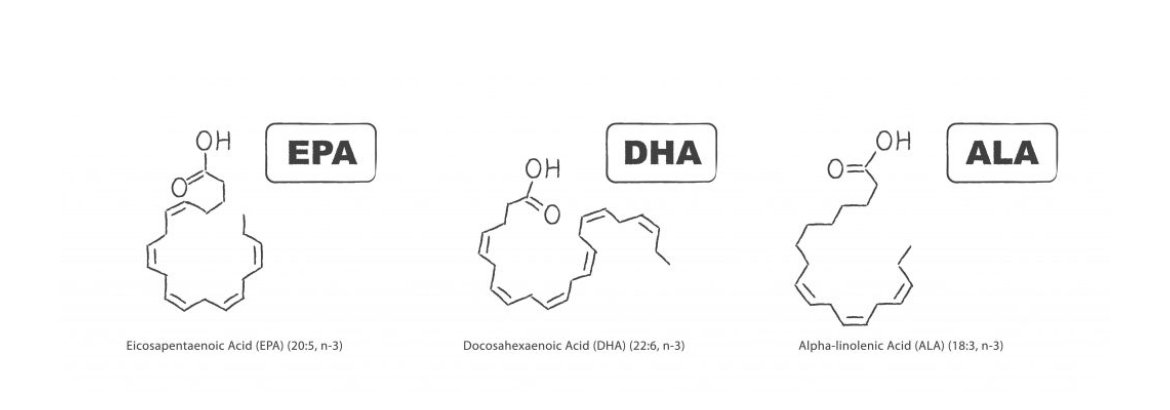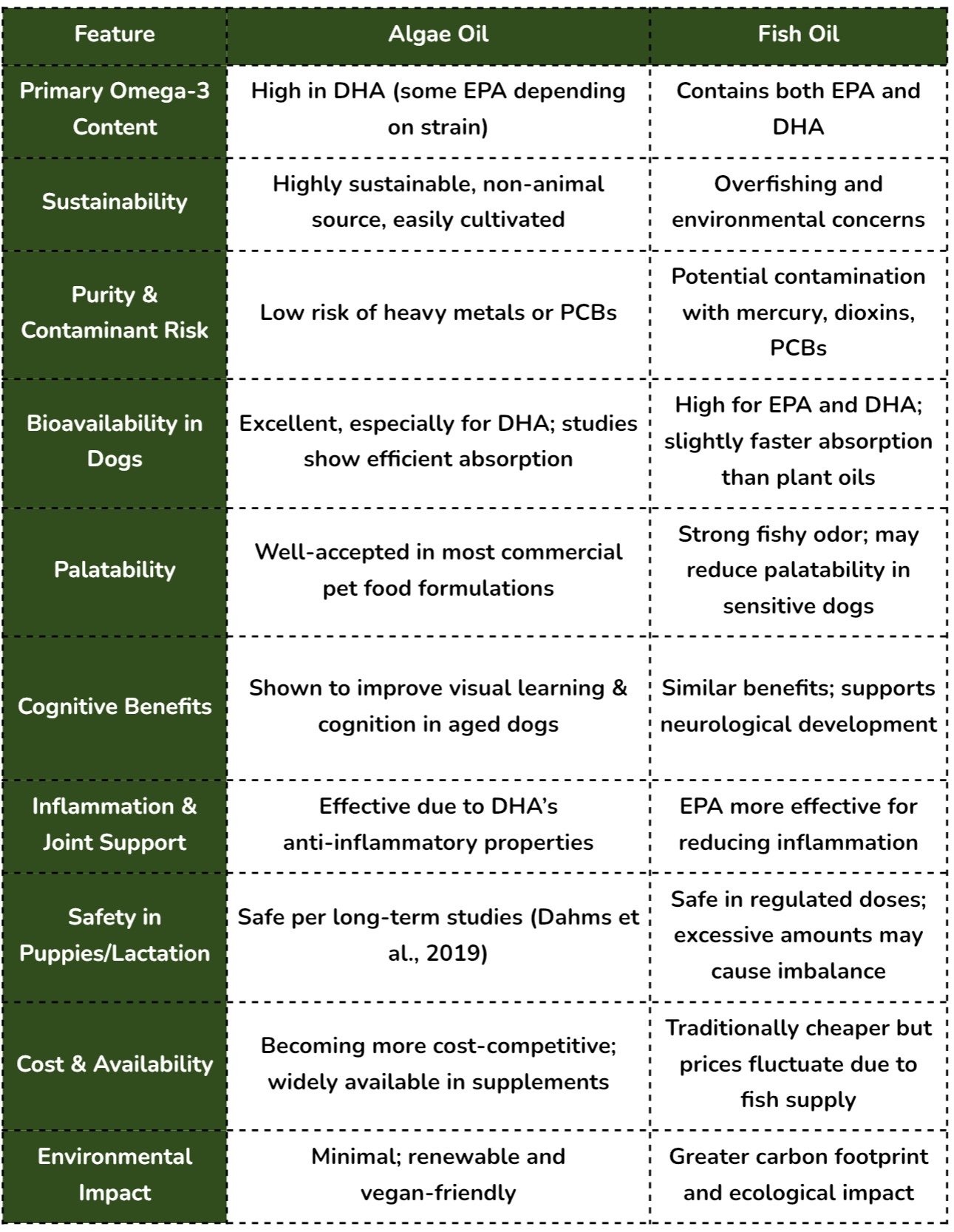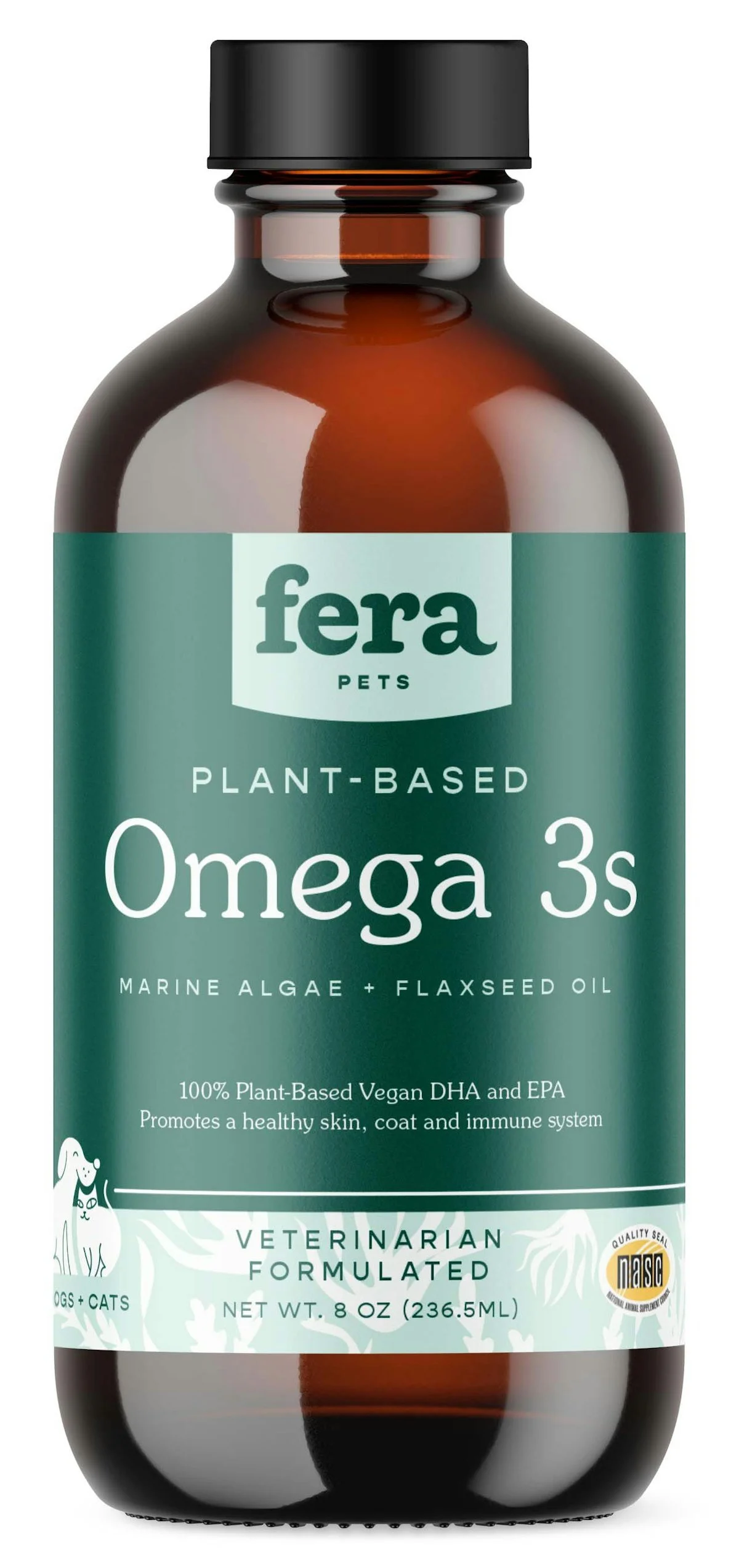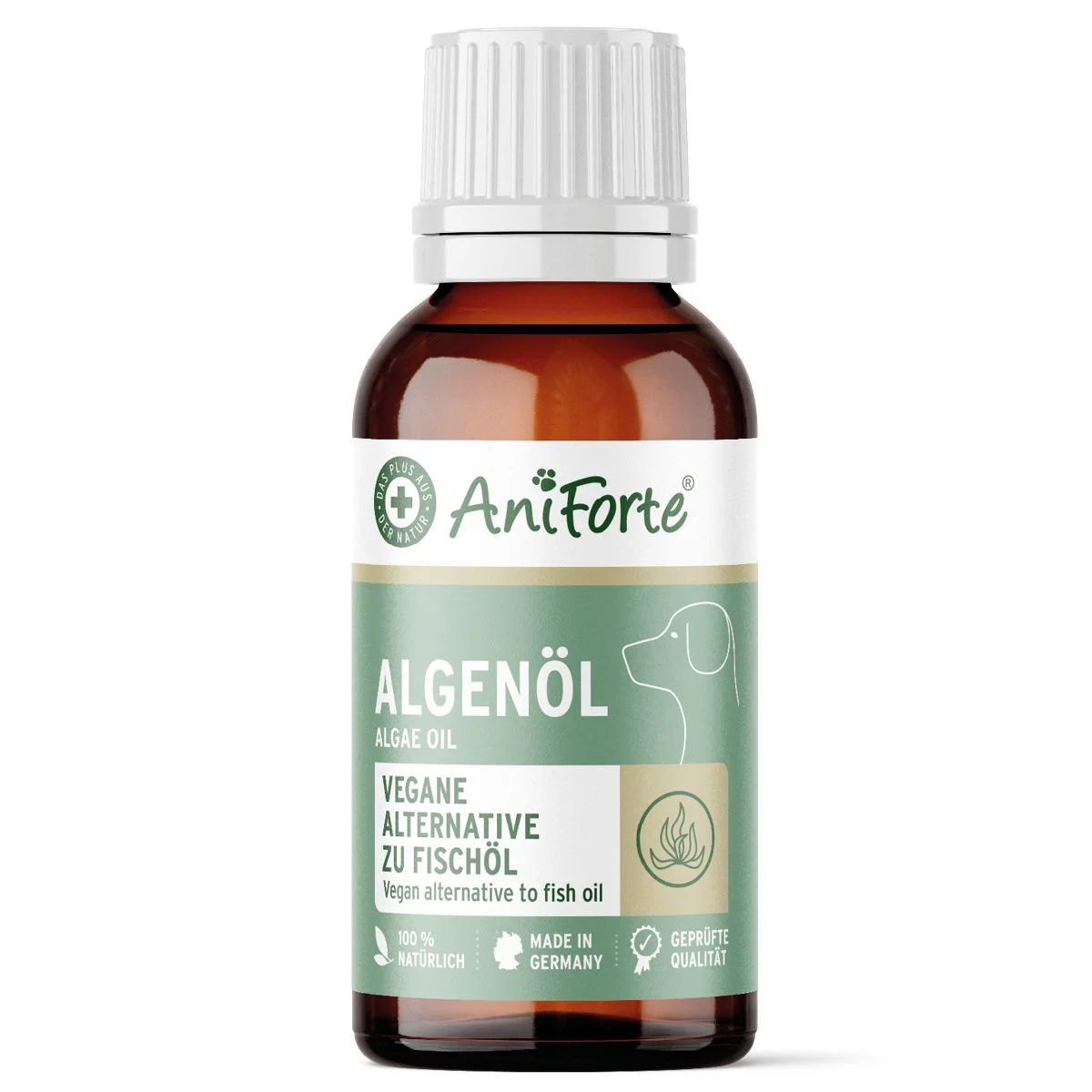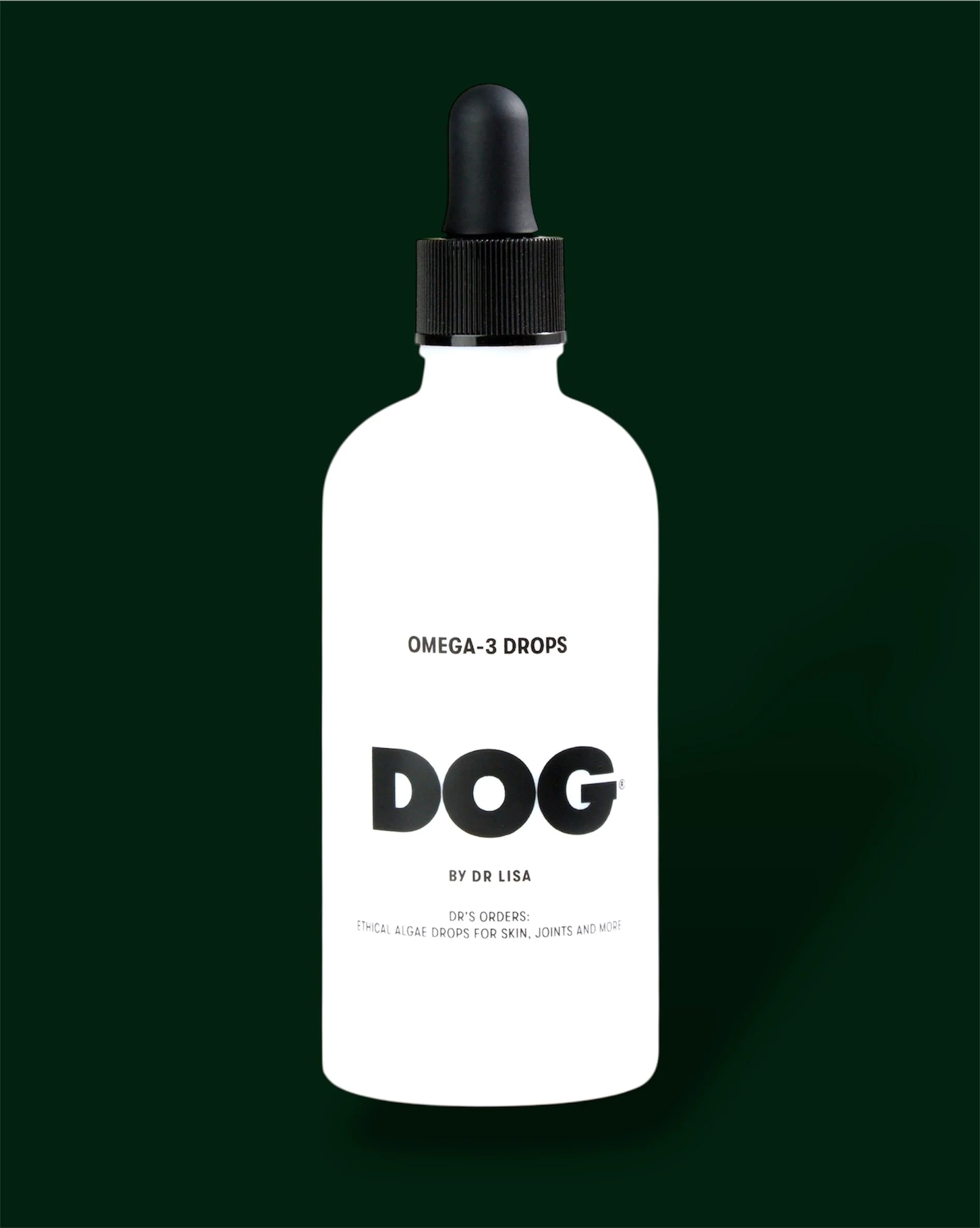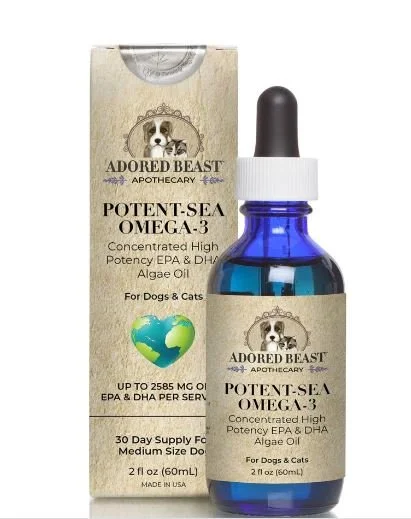Algae Oil for Dogs: A Powerful, Sustainable Omega-3 Supplement
Introduction: Why Omega-3s Matter in Canine Nutrition
Omega 3 fatty acids are essential polyunsaturated fats with proven health benefits for dogs, including support for the heart, brain, joints, skin, and immune system. The most critical Omega 3s are EPA (eicosapentaenoic acid) and DHA (docosahexaenoic acid). However, dogs struggle to convert plant-based ALA (alpha-linolenic acid) into EPA and DHA effectively, making direct supplementation vital.
According to Bauer (2011), conversion rates from ALA to EPA in dogs may fall below 10%, and to DHA as low as 1–4%, depending on breed and health status. Therefore, providing EPA and DHA directly—rather than relying on flaxseed or chia—is essential for achieving therapeutic outcomes.
Why Algae Oil Is the Best Plant-Based Omega-3 for Dogs
Algae oil, derived from marine microalgae like Schizochytrium sp. and Crypthecodinium cohnii, provides a clean, vegan source of both EPA and DHA. Unlike spirulina or chlorella, which contain mostly ALA, algae oil contains preformed long-chain Omega 3s essential for canine anti-inflammatory function and brain health.
Notably, certain algae oil products, particularly those derived from the Schizochytrium sp. strain, can achieve remarkably high concentrations of DHA, in some cases even exceeding the levels typically found in conventional fish oil supplements.
Science-Backed Benefits: What Research Says About Algal Omega-3s in Dogs
Several peer-reviewed studies validate the safety, bioavailability, and health outcomes of algae oil in canine nutrition:
Souza et al. (2019) found that algae-derived DHA improved immune markers, palatability, and oxidative stability in dog diets.
Read Study PDFZhang et al. (2025) compared algae and fish oil in dogs and found equivalent or superior outcomes in coat quality and inflammation reduction.
Algal Research LinkDahms et al. (2019) demonstrated that algae oil is safe for long-term use in gestating and lactating dogs, with no adverse effects on growth or reproductive success.
PLoS One LinkHadley et al. (2017) showed that supplementing Schizochytrium-based DHA improved cognitive performance in senior dogs, including visual learning and memory.
ScienceDirect Link
Top Benefits of Algae Oil Over Fish Oil for Dogs:
1. Direct source of EPA & DHA
2. Free from ocean contaminants like mercury, PCBs, or microplastics
3. Eco-friendly and sustainable—grown in land-based tanks
4. Highly bioavailable and well-tolerated
5. No fishy smell—ideal for picky dogs
A recent peer-reviewed study (Zhang et al.,) published in Algal Research found that Schizochytrium-derived algal oil supplementation in dogs showed equal or superior effects to fish oil on inflammatory markers and coat quality without side effects.
Environmental Impact: Why Algae Oil Wins
Algae oil is not only good for dogs—it’s better for the planet. Traditional fish oil production is linked to:
Overfishing
Habitat destruction
Bycatch of non-target species
Fish oil production contributes to overfishing, bycatch, and habitat degradation. Conversely, algae oil cultivation uses fewer resources, has a lower carbon footprint, and does not impact marin biodiversity.
In contrast, algal oil production uses land-based fermentation tanks, minimizing water use, waste, and emissions. A 2022 LCA report showed algae oil from closed-tank fermentation has up to 40% less climate impact than fish oil (Zhang, D., et al. (2022). LCA of autotrophic microalgae cultivation. Front. Mar. Sci., 9, 990635.).
Algae, particularly the microscopic varieties known as microalgae, represent the primary source of EPA and DHA in the entire marine food chain. Fish, often considered the conventional source of these Omega 3s, accumulate them by consuming these algae or other organisms that have ingested algae. Therefore, obtaining oil directly from microalgae offers a more direct route to these beneficial fatty acids, effectively bypassing the need for fish as an intermediary in the supply chain.
Algae cultivation generally has a lower carbon footprint compared to fish oil production, as it requires fewer natural resources like water and land and avoids the substantial fuel consumption associated with commercial fishing. Algae-based Omega 3s can be produced sustainably without depleting marine resources or causing significant habitat destruction, making them a more eco-friendly alternative.
As above, Numerous Life Cycle Assessment (LCA) studies have compared the environmental impact of algae oil and fish oil. Many of these assessments have indicated that Omega 3s derived from algae, particularly through fermentation processes, have a lower carbon footprint and a reduced impact on the depletion of biotic resources compared to traditional fish oil sources.
The production of algae oil is typically achieved through a sustainable process involving the controlled cultivation of microalgae in land-based facilities. These facilities, such as large-scale fermentation tanks or bioreactors, provide an environment where algae can thrive using renewable resources like sunlight and plant-derived sugars. This controlled cultivation method effectively mitigates the risk of contamination from ocean-borne pollutants, including heavy metals like mercury, lead, arsenic, and cadmium, as well as dioxins, PCBs, and radiation, which can accumulate in fish and subsequently in fish oil.
The extraction of oil from the harvested algae is often performed using natural and solvent-free methods, further enhancing the purity and safety of the final product. Certain species of microalgae, most notably Schizochytrium sp., possess the remarkable ability to produce substantial quantities of both EPA and DHA. This is a significant advantage, as not all plant-based sources of Omega 3s directly provide both of these crucial long-chain fatty acids. While some algae oils might be particularly rich in DHA, the presence of both EPA and DHA in significant amounts makes them a comprehensive and effective omega-3 supplement option for dogs, mirroring the benefits of high-quality fish oil without the associated environmental and contamination concerns.
However, it is important to note that certain LCA studies have identified potentially higher environmental impacts for specific algae production methods in particular categories, such as freshwater consumption, land use, and nutrient pollution. This is often attributed to the reliance on sugar as a feedstock for some heterotrophic algae cultivation. Nevertheless, ongoing advancements in technology, including the exploration of different photosynthetic algae and alternative carbon sources like glycerol, hold promise for further reducing these impacts in the future.
Science-Backed Health Benefits of EPA and DHA in Dogs
1. Joint Support & Arthritis Relief (EPA-Focused)
Mechanism: EPA reduces the production of inflammatory prostaglandins and cytokines, which are key drivers of osteoarthritis and joint pain in dogs.
Evidence: Lenox & Bauer (2013) reported that dietary EPA supplementation decreased carprofen (NSAID) requirements in dogs with osteoarthritis.
Bauer (2011) highlighted significant improvement in mobility and reduced lameness in arthritic dogs given fish oil rich in EPA.
2. Cognitive Health & Brain Development (DHA-Focused)
Mechanism: DHA is a structural component of brain cell membranes and critical for neurotransmission and neuroprotection.
Evidence: Hadley et al. (2017) found that senior beagles supplemented with Schizochytrium-derived DHA performed better on visual discrimination and memory tasks.
Zhang et al. (2025) confirmed improved cognitive function in older dogs using DHA-rich algae oil.
3. Skin and Coat Health
Mechanism: Omega 3s reduce skin inflammation and improve epidermal barrier function, helping with itching, dermatitis, and seborrhea.
Evidence: Roudebush (2007) noted that omega-3 fatty acid supplementation (including from algae) reduced pruritus and improved coat shine in allergic dogs.
Dogs with atopic dermatitis showed improved skin scores after 8 weeks on DHA and EPA supplements.
4. Cardiovascular Health
Mechanism: EPA and DHA support heart function by reducing triglycerides, normalizing heart rhythm, and lowering blood pressure.
Evidence: Freeman et al. (1998) showed fish oil reduced arrhythmias and left ventricular remodeling in dogs with dilated cardiomyopathy.
Omega 3 supplementation is now part of integrative heart failure treatment protocols.
5. Immune Function and Allergy Modulation
Mechanism: Omega 3s reduce Th2-skewed allergic responses and modulate pro-inflammatory eicosanoids and leukotrienes.
Evidence: Souza et al. (2019) found Schizochytrium DHA supplementation improved immune and inflammatory profiles in dogs.
Algae oil helped reduce allergic symptoms in sensitive dogs when added to diets.
6. Reproductive and Developmental Support
Mechanism: DHA is essential for fetal brain and retinal development; EPA supports placental blood flow.
Evidence: Dahms et al. (2019) validated the safety of DHA-rich algal oil in pregnant and lactating dogs, showing healthy pup development.
7. Anti-Cancer and Cachexia Support
Mechanism: Omega 3s may reduce inflammation-driven tumor progression and improve appetite in cancer-affected dogs.
Evidence: Magalhães et al. (2021) in a systematic review noted positive adjunctive roles of EPA/DHA in dogs with neoplastic conditions.
DHA to EPA Conversion: Does the Ratio Matter?
Metherel et al. (2019) found DHA supplementation increased EPA in plasma not by retroconversion but by slowing EPA metabolism. Thus, DHA-rich algae oil still boosts total Omega 3 levels in dogs.
Both EPA and DHA exert significant anti-inflammatory effects, playing a crucial role in managing joint health in dogs. These Omega 3 fatty acids interfere with the body's production of pro-inflammatory molecules, such as prostaglandins and leukotrienes, which are key contributors to the pain, stiffness, and inflammation associated with conditions like osteoarthritis. EPA is particularly recognized for its direct anti-inflammatory actions and its potential to reduce the reliance on NSAIDs in managing arthritis symptoms. Numerous scientific investigations and clinical trials have consistently shown that Omega 3 fatty acid supplementation, including sources like marine oils, leads to significant improvements in weight-bearing, mobility, and overall quality of life for dogs suffering from osteoarthritis. These studies have documented reductions in lameness and discomfort, as well as enhanced ability to perform daily activities.
DHA plays a pivotal role in the development and function of the canine brain. It is a major structural component of brain tissue, especially crucial during the rapid brain growth phase in puppies, and it continues to support cognitive functions such as memory, learning, and problem-solving throughout a dog's life. As a primary n-3 PUFA in the brain, DHA constitutes a significant portion of the fatty acids within neuronal cell membranes and is integral to various processes essential for optimal brain function. Research has indicated that puppies receiving DHA supplementation during critical developmental periods exhibit improved learning capabilities, enhanced memory retention, and better overall cognitive performance. Furthermore, studies have suggested that DHA supplementation can be beneficial for older dogs experiencing signs of canine cognitive dysfunction (CCD), potentially improving their recognition of family members and overall cognitive function.
Omega 3 fatty acids, including EPA and DHA, are also crucial for maintaining healthy skin and a lustrous coat in dogs. These essential fats contribute to the skin's barrier function, helping to reduce dryness, itching, and inflammation associated with allergies and other skin conditions. Studies have shown that supplementing with fish oil, a rich source of EPA and DHA, can lead to less itching and self-trauma, as well as an overall improvement in coat health in dogs suffering from allergies. Similar benefits are anticipated with algae oil due to its comparable content of these Omega 3s.
Furthermore, Omega 3 fatty acids, particularly EPA, have been shown to support cardiovascular health in dogs. They can help reduce the risk of abnormal heart rhythms, act as an anticoagulant to prevent blood clot formation, and may contribute to improved heart function and blood pressure regulation. Research has also suggested that Omega 3 supplementation might help reduce weight loss and improve survival times in dogs with heart failure.
Spirulina and Chlorella Are Not True Omega-3 Sources
Spirulina and chlorella are often marketed as nutrient-rich superfoods, but when it comes to providing essential Omega 3 fatty acids for dogs, they fall short. While these microalgae offer various health benefits, they are not reliable sources of the long-chain Omega 3s—EPA (eicosapentaenoic acid) and DHA (docosahexaenoic acid)—that are crucial for canine health.
Spirulina: Nutrient-Dense but Lacking in EPA and DHA
Spirulina is a blue-green algae known for its high protein content and array of vitamins and minerals. However, its Omega 3 content is predominantly in the form of alpha-linolenic acid (ALA), a short-chain fatty acid. Dogs have a limited ability to convert ALA into the more beneficial long-chain fatty acids EPA and DHA, with conversion rates often less than 5% .
This limited conversion means that even though spirulina contains ALA, it does not provide sufficient amounts of EPA and DHA to meet your dog’s needs. Therefore, relying on spirulina as a primary Omega 3 source is not advisable for canine health.
Chlorella: Green Algae With Limited Fatty Acid Profile
Chlorella, a green microalga, is another supplement sometimes touted for Omega 3 content. It does contain some polyunsaturated fatty acids, including ALA, but, like spirulina, it lacks meaningful amounts of EPA and DHA. Most of the Omega 3s in chlorella are short-chain and require conversion—again, a biological bottleneck in dogs.
In fact, research published in the Journal of Nutritional Science highlights that while chlorella can be a source of micronutrients and antioxidants, its Omega 3 profile is inadequate for meeting dietary needs in companion animals. Unlike true marine microalgae like Schizochytrium sp.—the primary species used in high-quality algae oil supplements—chlorella does not naturally synthesize significant long-chain Omega 3s.
Why This Matters for Your Dog
Dogs need DHA and EPA for anti-inflammatory support, heart health, cognitive function, and healthy skin. These Omega 3s are found abundantly in whole oily fish, Fish oil, Green lipped mussels, Calamari Oil and now, more sustainably, in algae oil derived from marine microalgae. Spirulina and chlorella simply don’t offer these benefits.
In contrast, algae oil from true EPA/DHA-producing microalgae bypasses the conversion issue. It’s directly bioavailable, highly digestible, and vegan-friendly, making it a superior Omega 3 source for dogs—especially those with fish allergies or owners who prefer plant-based alternatives.
Summary:
Spirulina and chlorella contain trace amounts of ALA, not EPA or DHA.
Dogs can’t efficiently convert ALA into the active forms they need.
For therapeutic Omega 3 benefits, algae oil from marine microalgae like Schizochytrium is the scientifically backed choice.
How to Choose the Best Algae Oil for Dogs
Checklist:
1. EPA + DHA per Dose
2. 3rd-Party Tested for Purity
3. Cold-Pressed or CO₂-Extracted
4. Dark Glass Bottles
5. Closed System Cultivation
6. No Fillers or Preservatives
7. Ethical Brand Transparency
Top Products by Country
USA/Canada/UK: Adored Beast Potent-Sea (UK link here)
USA Alternative: Fera Pet Organics algae
UK Alternative: Aniforte algae oil
Australia: DogByLisa algae Omega Drops
Conclusion
Algae oil is a clinically validated, sustainable, and highly effective Omega 3 supplement for dogs. With its rich DHA content, proven bioavailability, and minimal ecological footprint, it outperforms plant oils and rivals fish oil in nearly all metrics—without the environmental baggage.
Whether you’re supporting a senior dog’s cognition, soothing itchy skin, or protecting joints from arthritis, algae oil offers a clean, ethical, and evidence-based solution.
Sources
Bauer J E (2011) Therapeutic use of fish oils in companion animals. JAVMA 239 (11), 1441-1451 Bauer J E (2011) Therapeutic use of fish oils in companion animals. JAVMA 239 (11), 1441-1451.
Schizochytrium sp. as a DHA source in canine diets. Wiley Online Library. Souza, C.M.M., et al. (2019).
Algal oil safety in gestation-lactation-growth study in Beagles. PLoS One, 14(6), e0217794. Dahms et al. (2019)
The oil-rich alga Schizochytrium sp. as a dietary source of docosahexaenoic acid improves shape discrimination learning associated with visual processing in a canine model of senescence, Prostaglandins, Leukotrienes and Essential Fatty Acids, Volume 118, 2017,Pages 10-18,K.B. Hadley, J. Bauer, N.W. Milgram.
Zhang, D., et al. (2022). LCA of autotrophic microalgae cultivation. Front. Mar. Sci., 9, 990635. https://doi.org/10.3389/fmars.2022.990635
Lenox CE, Bauer JE. Potential adverse effects of omega-3 Fatty acids in dogs and cats. J Vet Intern Med. 2013;27(2):217-26.
Hadley, K.B., et al. (2017). DHA from Schizochytrium improves shape discrimination learning in aged dogs. Prostaglandins Leukot Essent Fatty Acids, 126, 1–9.
Zhang, Z.X., et al. (2025). Efficacy and safety of algal omega-3 in dog food. Algal Research.
Roudebush, P. (2007). Fatty acid supplements: Do they really work? CAB Abstracts.
Freeman, L.M., et al. (1998). The effect of omega-3 fatty acids on heart failure. J Vet Intern Med.
EPA/DHA supplementation in neoplastic and non-neoplastic conditions: A systematic review. In Vivo, 35(3), 1419–1429.Magalhães et al. (2021)
Nesbitt, G.H. et al (2003) Effect of n-3 fatty acid ratio and dose on clinical manifestations, plasma fatty acids and inflammatory mediators in dogs with pruritus. . Vet. Dermatology 14:67-74
Beneficial effects of omega-3 fatty acids in cardiovascular disease Journal of Small Animal Practice (2010) 51, 462–470 DOI: 10.1111/j.1748-5827.2010.00968.x
Compound-specific isotope analysis reveals no retroconversion of DHA to EPA but substantial conversion of EPA to DHA following supplementation: a randomized control trial Adam H Metherel et al. Am J Clin Nutr. 2019.
Supplements We Recommend


